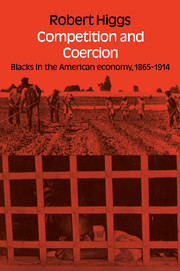Book contents
- Frontmatter
- Contents
- List of tables
- Preface
- “Race” and “racial discrimination”: A prefatory note on usage
- 1 Approaching the facts
- 2 The people
- 3 The people at work, 1865–1880
- 4 The people at work, 1880–1914
- 5 The fruits of their labors
- 6 Overview and interpretation
- Technical appendix
- Notes
- Select bibliography
- Index
3 - The people at work, 1865–1880
Published online by Cambridge University Press: 07 October 2011
- Frontmatter
- Contents
- List of tables
- Preface
- “Race” and “racial discrimination”: A prefatory note on usage
- 1 Approaching the facts
- 2 The people
- 3 The people at work, 1865–1880
- 4 The people at work, 1880–1914
- 5 The fruits of their labors
- 6 Overview and interpretation
- Technical appendix
- Notes
- Select bibliography
- Index
Summary
We have only to reflect for a moment upon the situation in which these people found themselves when liberated. Consider their ignorance, their poverty, their destitution, and their absolute dependence upon the very class by which they had been held in bondage for centuries, a class whose every sentiment was averse to their freedom, and we shall be prepared to marvel that they have, under the circumstances, done so well.
Frederick Douglass, 1880The Northern politicians and soldiers who effected the emancipation of the American slave population disagreed about the appropriate design of a post-emancipation economy and the part that blacks would play in it. Some, like the Radical Republicans George Washington Julian and Thaddeus Stevens, wanted to confiscate the land of wealthy rebels for free distribution among the freedmen. Others proposed that land abandoned by Southerners during the war be sold to the freedmen on easy terms. Some, like Senator Charles Sumner, wished to retain the Freedmen's Bureau indefinitely as a regulatory agency mediating between the freedmen and their erstwhile masters to insure fair play. Most, however, gave little thought to the matter, supposing that no special action by the federal government was necessary and that the situation would turn out all right if simply left under the unimpeded influence of market forces.
- Type
- Chapter
- Information
- Competition and CoercionBlacks in the American economy 1865-1914, pp. 37 - 61Publisher: Cambridge University PressPrint publication year: 1977



